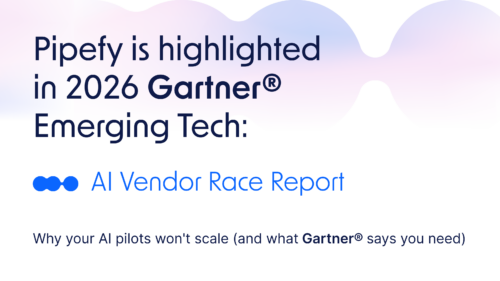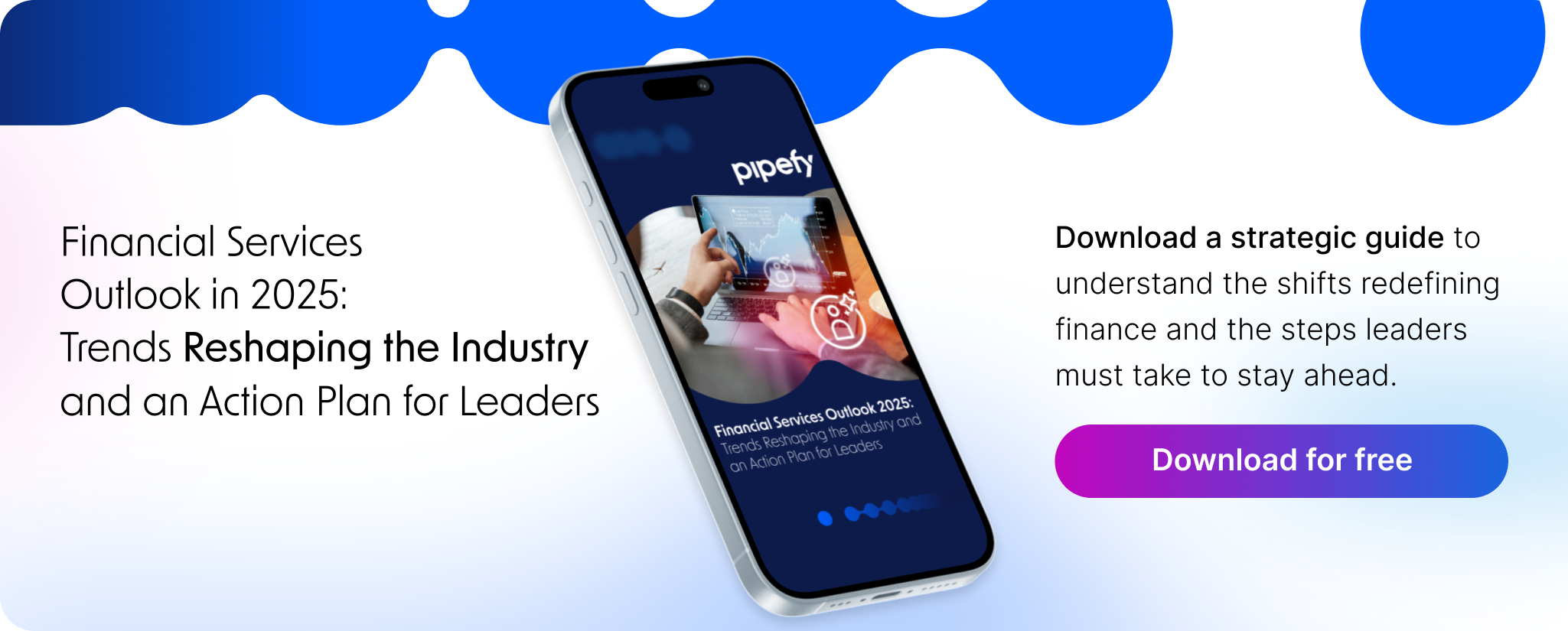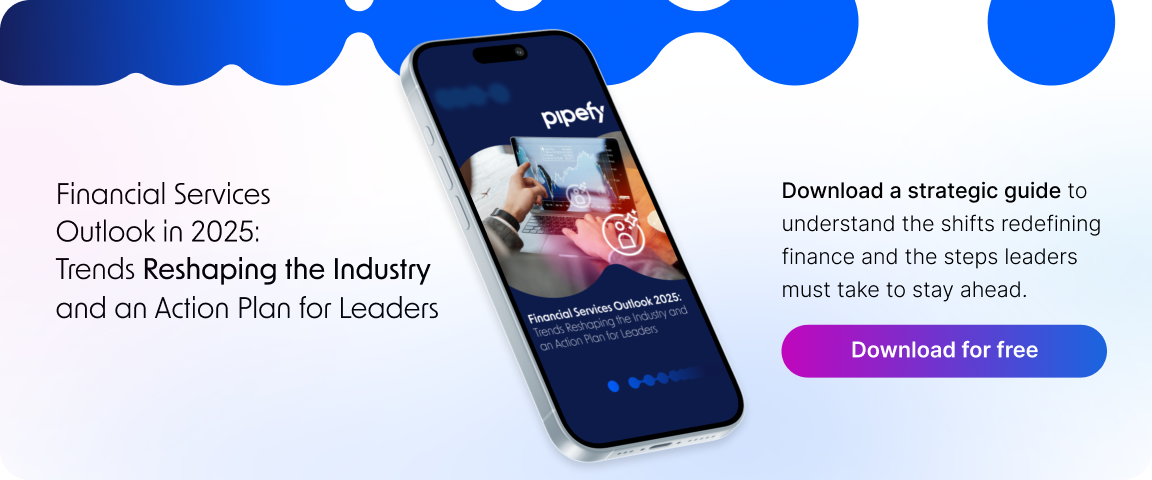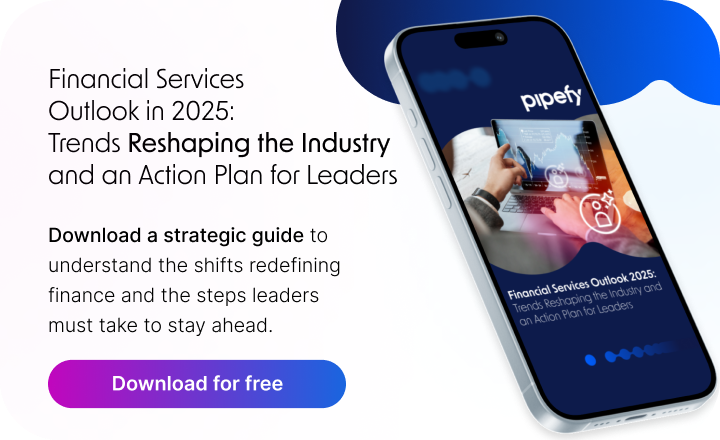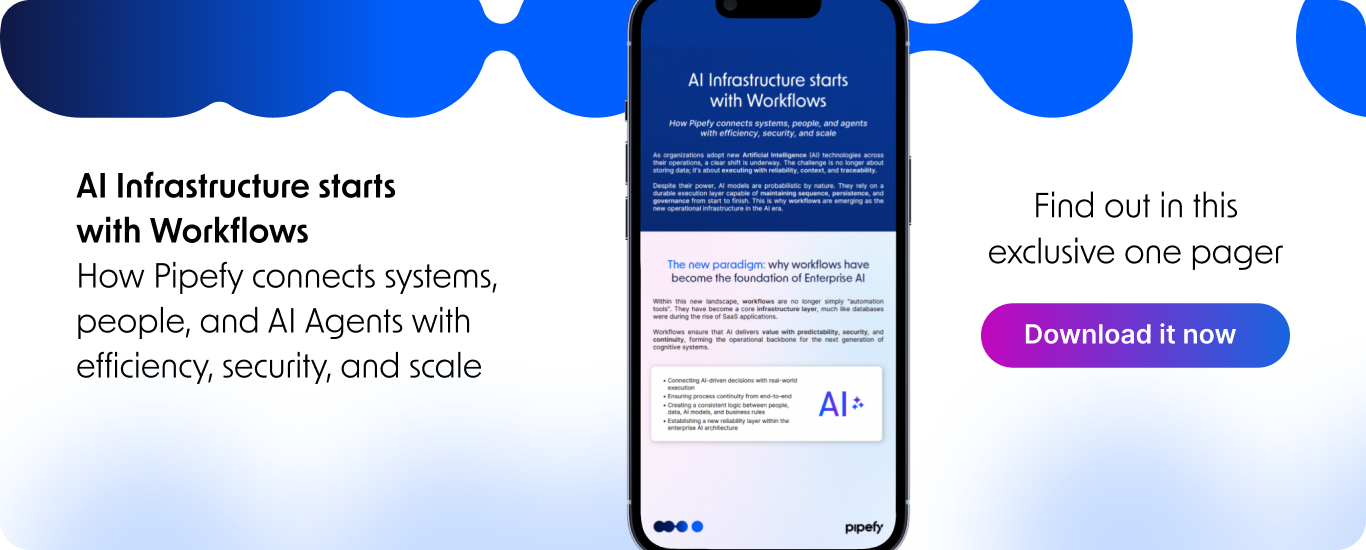ARTICLE SUMMARY
Empower your teams with citizen development. Learn how no-code automation accelerates innovation and eliminates IT backlogs.

In recent years, the concept of citizen developers has gained momentum as organizations seek faster, safer ways to innovate. Across industries and company sizes, IT teams face growing backlogs and delays in delivering critical projects, creating a major operational bottleneck.
At the same time, low-code/no-code platforms, such as Pipefy, have evolved to offer a broad set of accessible, enterprise-grade features: Embedded AI, AI Agents (Agentic AI), workflow management, analytics, and monitoring, all within a secure and scalable ecosystem.
For instance, Pipefy has evolved beyond simple automation tools into an AI-powered workflow orchestration hub. By combining structured processes, business rules, and AI Agents, organizations can automate, execute, and continuously optimize workflows within a secure and governed environment.
Within this landscape, citizen development has emerged as a strategic path for distributing solution-building across business areas. It empowers employees with intuitive no-code tools to design structured workflows and deploy AI Agents under centralized governance. This ensures autonomy for business teams without compromising security, compliance, or IT oversight.
This article explores who citizen developers are, the benefits of this approach, and how organizations can start building their own programs.
Who Are Citizen Developers and How Are They Redefining Solution Delivery?
A citizen developer is a professional who, even without advanced programming skills, creates or customizes applications using low-code/no-code platforms, environments that require little to no traditional coding.
They don’t replace IT developers; instead, they extend the organization’s technological capacity, building solutions that align directly with operational and strategic goals.
Generally speaking, a citizen developer profile includes the following traits:
- Deep understanding of their department’s processes
- Ability to identify bottlenecks and automation opportunities
- Comfort working with visual tools to design workflows, forms, and integrations
- Collaboration with IT to ensure security and compliance
In today’s corporate environment, citizen development acts as a bridge between digital strategy and practical execution, fostering innovation without compromising governance.
The most common thing I’ve heard during my ten years in product and IT is the ‘infinite backlog’ — the constant struggle to prioritize internal process automation. Citizen developers are changing that reality. They create fast solutions that drive innovation, productivity, efficiency, and autonomy across business teams, while reducing costs and accelerating workflows.
Mity Hoshino
Low-Code Product Manager at Pipefy

Key Benefits of Citizen Development for Businesses and Professionals
Encouraging citizen development can generate tangible results for both organizations and employees.
Some of the main benefits include:
- Faster project delivery: Workflows that once took months can now be implemented in weeks or even days
- Relief for IT teams: When simple workflows are handled by business users, IT can focus on more strategic, high-complexity projects
- Increased engagement and innovation: Employees become active contributors to continuous improvement, enhancing their sense of ownership
- More data-driven decisions: Built-in analytics and monitoring features help teams track results and optimize processes using performance indicators
- Faster AI adoption with measurable ROI: Organizations can deploy AI Agents in weeks, not months, achieving up to 40% reduction in manual activities, and even 60–90% when AI Agents are fully integrated into workflows.
According to IDC’s study “Accelerating the Impact of Robotic Process Automation”, organizations that enable citizen developers experience remarkable outcomes: 30% cost reduction and 27% higher gains in quality and revenue improvements. Moreover, 76% of these companies promote their citizen developers into higher-value roles within the organization.
How Low-Code/No-Code Platforms with AI Agents Empower Citizen Developers
Modern low-code/no-code platforms offer far more than ease of use.
In the case of Pipefy, the platform provides:
- Structured workflows built on business rules and automation
- AI Agents that execute, decide, and orchestrate end-to-end processes
- Human-in-the-loop controls for supervision and approvals
- Native integrations and APIs connecting core systems and legacy tools
- Real-time observability and analytics for full process transparency
By combining enterprise-level functionality with an intuitive design, Pipefy delivers a complete environment where citizen developers can create scalable, auditable, and secure workflows aligned with business objectives.
This shift represents the evolution from automation to autonomation, where AI Agents don’t just execute predefined rules but can dynamically interpret context, take action, and collaborate with humans across workflows.
Key Processes Citizen Developers Can Transform and Automate
Citizen developers bring the most value to repetitive, data-driven, or integration-intensive processes.
Examples include:
- HR workflows such as recruiting and employee onboarding
- Customer and vendor onboarding with automated validation
- Internal approvals for purchases, travel, or reimbursements
- Contract management with automated alerts and due dates
- Service request handling with AI-driven classification
Every department can benefit from citizen developers, especially customer service, sales, HR, and finance, which handle large volumes of repetitive processes.
Mity Hoshino
Low-Code Product Manager at Pipefy

Departments That Benefit the Most from Citizen Development
| Business Area | Examples of Automations | Expected Benefits |
| Human Resources | Automated onboarding and offboarding; employee integration workflows | Faster onboarding and fewer manual errors |
| Finance | Expense approvals, credit analysis, payment reconciliation | Greater control and faster approvals |
| Customer Service | Ticket prioritization, automated responses via AI Agents | Improved customer experience and faster response time |
| Operations | Inventory and logistics management integrated with ERP systems | Enhanced visibility and operational efficiency |
The table above illustrates how different business areas can leverage citizen development to build automations that deliver measurable results.
Read more: How to choose the right AI Agent for your process automation
Practical Example: How Citizen Developers Accelerate Claims Processing in Insurance
Let’s take a mid-sized insurance company struggling with delayed claim analysis due to manual processes and fragmented communication between operations, legal, and service departments.
The average processing time is 15 business days, hurting customer satisfaction and brand reputation.
To solve this, the company adopts Pipefy’s AI-powered workflow orchestration platform, deploying specialized AI Agents for claims intake, document verification, fraud detection, and decision support.
Acting as citizen developers, the operations team builds a custom workflow with:
- A digital form for claim submissions, eliminating scattered emails
- A Document Reading Agent to extract and validate information from reports and invoices
- An Anti-Fraud Agent to cross-check internal and external data sources
- A Conversational Agent to interact with policyholders in real time
- A Terms Formalization Agent to generate compliant settlement documents
- Real-time integrations with the policy management system
- Analytics dashboards for monitoring deadlines and bottlenecks
Within three months, the average claim cycle drops to five business days, rework decreases by 40%, and policy renewal rates increase significantly.
Though hypothetical, this example highlights how citizen development powered by no-code automation can optimize critical business operations quickly and safely.
Unlike traditional enterprise platforms that require heavy customization or IT-dependent development cycles, Pipefy enables business teams to design, deploy, and evolve AI Agents using natural language within a governed no-code environment, reducing dependency on external consultants and accelerating time to value.
A Strategic Roadmap to Becoming a Citizen Developer
Building a successful citizen development program requires careful planning to ensure long-term, sustainable results.
A practical roadmap includes the following steps:
- Choose the right platform: Look for solutions that combine low-code/no-code, Embedded AI, and centralized governance, like Pipefy, to ensure usability and security
- Establish governance rules: Define roles, permissions, and approval workflows to avoid duplication and maintain quality standards
- Start small: Begin with simple, high-impact processes to gain confidence and demonstrate results
- Measure performance: Use analytics and monitoring tools to track efficiency, execution time, and cost savings
- Scale gradually: As experience grows, expand to more complex, cross-departmental workflows
Following these steps helps organizations structure a solid citizen development program that balances agility with governance.
Everything starts with choosing the right low-code/no-code platform, one that’s easy and friendly to use. Once that’s in place, teams can begin deploying initial workflows and training sessions across departments.
Mity Hoshino
Low-Code Product Manager at Pipefy
How Pipefy Enables and Supports Citizen Developers with a No-Code Hub
Pipefy acts as an AI Enabler for business operations. More than a workflow platform, it provides a governed environment where AI Agents and humans collaborate to execute, monitor, and continuously improve structured processes.
Built on BPM foundations, Pipefy ensures context-aware intelligence, human-in-the-loop collaboration, and transparent observability, eliminating the “black box” effect often associated with AI adoption.
With a natural language AI Builder and a visual no-code interface, teams can create workflows and deploy AI Agents in minutes — without technical expertise — while maintaining full control through role-based permissions and business rules.
AI Agents can orchestrate complex, end-to-end processes across multiple departments and systems. Meanwhile, the internal marketplace offers ready-to-use templates and pre-configured integrations, speeding up deployment.
Equally important, workflow analytics and monitoring provide real-time visibility into process performance, enabling quick adjustments when needed. All of this flexibility is built upon centralized governance, ensuring compliance and data security.
Discover how Pipefy’s AI Agents can multiply your team’s capacity, reduce manual workload, and transform structured processes into intelligent, autonomous operations:
